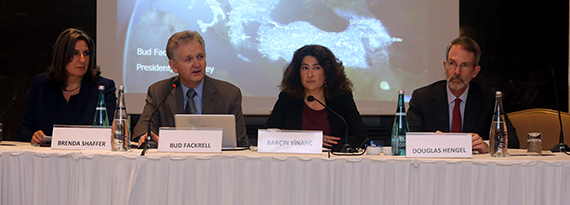
On 14 October 2015, Turkish Policy Quarterly (TPQ) hosted its sixth annual energy geopolitics roundtable, titled “Regional Natural Gas Game-Changers: Securing Supplies amid Volatility.” The event was made possible with the support of BP Turkey.
The panel featured:
Speakers
- Bud Fackrell: President, BP Turkey
- Douglas Hengel: Senior Resident Fellow, The German Marshall Fund of the United States
- Brenda Shaffer: Visiting Researcher, Center for Eurasian, Russian and East European Studies (CERES), Georgetown University. Professor, School of Political Science, University of Haifa, Israel
Moderator
- Barçın Yinanç: Op-ed Editor of Hurriyet Daily News
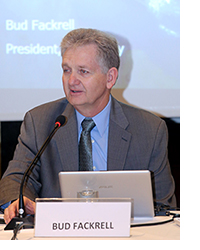 Bud Fackrell kicked off the roundtable discussion by talking about the Southern Gas Corridor (SGC), which he called a game-changer for the region and for Europe. In light of growing European demand and decreasing European production levels, he stated that the demand can be filled by three potential sources: increased Russian supplies, LNG imports, and imports via the SGC. Bud Fackrell kicked off the roundtable discussion by talking about the Southern Gas Corridor (SGC), which he called a game-changer for the region and for Europe. In light of growing European demand and decreasing European production levels, he stated that the demand can be filled by three potential sources: increased Russian supplies, LNG imports, and imports via the SGC.
Fackrell explained that the SGC “is a gas value chain” – comprised of the South Caucasus Pipeline Expansion (SCPX), the Trans Anatolian Pipeline (TANAP), and the Trans Adriatic Pipeline (TAP) – that will carry natural gas from the Shah Deniz II field in the Caspian Sea into Europe. He emphasized that as one of the world’s largest energy projects – in which BP is involved in every part of the value chain – the SGC is a collaboration between seven governments, 11 gas companies, and 11 buyers.
Providing the audience with several important status updates, Fackrell pointed out that approximately 50 percent of the procurement, engineering, and construction work needed to develop the Shah Deniz II field and the expansion of the SCP have been completed, with Turkey scheduled to receive the first gas inflow in 2018 and Europe in early 2020. Moving on to TANAP, he explained that following the foundation-laying ceremony held in Kars in March 2015, 320 km of land has been cleared, and construction has begun in five places on the pipeline. Nearly 75 percent of the pipes used in TANAP are produced in Turkey, an endeavor that has generated jobs and positively impacted the Turkish economy. In line with TAP’s later delivery schedule, Fackrell reported that its construction started later in comparison to the other pipelines. The construction of roads and access bridges in Albania is underway and TAP is working on land acquisition, engineering design, and securing and tendering its main contracts.
In his concluding remarks, Fackrell asserted that SGC is a real project as opposed to a political one; commitments have been made and it will go forward.
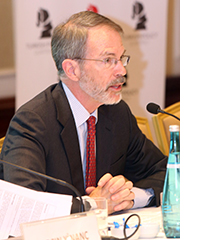 Douglas Hengel began his comments by underlining that European energy security has been and will continue to be a priority of the US: reducing European energy vulnerabilities means enhancing European freedom of action, thus making it a stronger partner for the US. However, the “weak link” continues to be South Eastern Europe, which is still highly dependent on Russian natural gas. Hengel noted strong US support for the Southern Gas Corridor and that the construction of an interconnector between Bulgaria and Greece – currently undergoing final investment decisions – would constitute a major step towards enhancing diversification and stability in the region. Douglas Hengel began his comments by underlining that European energy security has been and will continue to be a priority of the US: reducing European energy vulnerabilities means enhancing European freedom of action, thus making it a stronger partner for the US. However, the “weak link” continues to be South Eastern Europe, which is still highly dependent on Russian natural gas. Hengel noted strong US support for the Southern Gas Corridor and that the construction of an interconnector between Bulgaria and Greece – currently undergoing final investment decisions – would constitute a major step towards enhancing diversification and stability in the region.
Commenting on two other proposed projects that foresee delivering natural gas to Europe – Turkish Stream and Nord Stream II – Hengel asserted that Turkish Stream, or “South Stream by another name,” would not contribute to improving Europe’s energy security. Similarly, Nord Stream II would deliver the same Russian gas to Europe, by bypassing Ukraine and rerouting through Germany. Hengel emphasized that these pipelines seem to run counter to EU energy goals, and Nord Stream II in particular sends a terrible message to Ukraine.
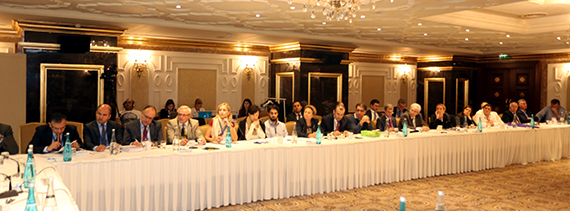
Hengel identified potential US LNG exports to Europe as a true game-changer for the natural gas landscape. He noted that in the US, there are five approved projects underway with a capacity of over 90 bcma of natural gas by 2020, with the first exports leaving the US at the end of 2015. In addition to the US, Australia also will become a very large exporter, with seven new projects of its own coming on line in the next two years. In consideration of the additional US LNG projects that are in their early stages of development, Europe’s future LNG imports could match the volumes it imports from Russia, which presents a huge opportunity for diversification of European supplies. Hengel explained that Europe has the ability to receive much greater volumes, given that in 2014 only one-quarter of Europe’s re-gasification capacity was utilized.
Hengel concluded by touching on Turkey’s aspirations to become an energy hub. In order for this to become a reality, he argued that the Turkish sector needs “more competition, transparency, and storage.” With BOTAŞ controlling 80 percent of the natural gas market in the country, liberalization of the gas sector is a necessity for Turkey to become a true trading hub.
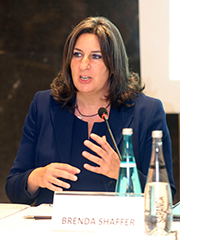 Brenda Shaffer spoke on Eastern Mediterranean natural gas dynamics and the potential impact the lifting of sanctions on Iran would have on regional gas markets. She pointed out the tendency to approach new discoveries in the region, such as the Zohr natural gas field off the Egyptian coast, through a “zero-sum” lens. Refuting that approach, she claimed: “One discovery does not replace another’s chance of reaching the market and in fact the more resources there will be in the basin, the greater chances there are of major export.” She further explained that Cyprus and Israel’s export prospects are not affected by the Zohr discovery: Cyprus’s current volumes are too small to justify an international export project and Israel’s current volumes available for export are more likely to be exported to close neighbors. Given BP’s important decision to invest 12 billion dollars in exploration in the West Nile, Shaffer posited that the Zohr field is the first of what will be a number of new discoveries in Egypt. Brenda Shaffer spoke on Eastern Mediterranean natural gas dynamics and the potential impact the lifting of sanctions on Iran would have on regional gas markets. She pointed out the tendency to approach new discoveries in the region, such as the Zohr natural gas field off the Egyptian coast, through a “zero-sum” lens. Refuting that approach, she claimed: “One discovery does not replace another’s chance of reaching the market and in fact the more resources there will be in the basin, the greater chances there are of major export.” She further explained that Cyprus and Israel’s export prospects are not affected by the Zohr discovery: Cyprus’s current volumes are too small to justify an international export project and Israel’s current volumes available for export are more likely to be exported to close neighbors. Given BP’s important decision to invest 12 billion dollars in exploration in the West Nile, Shaffer posited that the Zohr field is the first of what will be a number of new discoveries in Egypt.
Shaffer urged the audience to view the Eastern Mediterranean as not only a natural gas producing region, but also as a gas consuming region. For example, electricity in the region is still being produced by oil, which is very expensive and polluting. Stable electricity is essential for political stability and improving economic growth in the region. In addition, the natural gas volumes can be used to eradicate the region’s water shortages, through enabling desalination projects.
During her presentation, Shaffer also commented on Iran and its reentry into the global energy market. In terms of Iran’s strategy, she argued that the Islamic Republic would most likely use its volumes for re-injection into its oil fields and for domestic consumption. She cautioned that new Iranian production in the South Pars field could trigger a demarcation conflict between Iran and Qatar – a dispute that had been dormant when Iran was under sanctions.
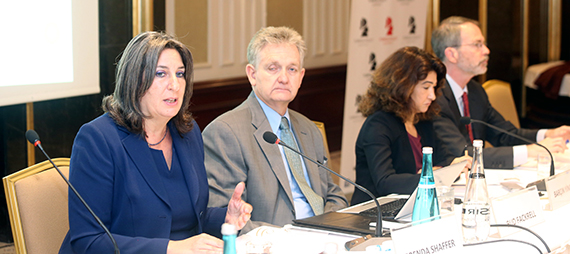
Counter to EU policy statements, Shaffer argued that Iran would not be able to export to Europe in the short-term. Shaffer explained that while we will witness in the coming period a great deal to energy diplomacy related to potential Iranian gas exports to Europe, this is far off. She stated that: “Iran is a net gas importer; the country exports fewer volumes to Turkey and Armenia than it imports from Azerbaijan and Turkmenistan.” She also cautioned that even in the long-term, Russia could try to block potential Iranian exports from coming to the EU, which would lengthen the process considerably. Gazprom bought up a gas pipeline in 2007 from Iran to Armenia, to ensure that this route would not be used at some point to export Iranian gas to farther markets.
Shaffer cautioned that the recent flare up of the Azerbaijan-Armenia conflict could add an additional element of insecurity in this already volatile area and further escalation should be prevented.
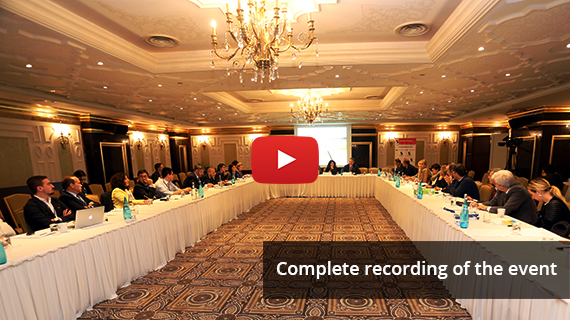
In the lively Q & A section, the 65 participants brought up additional important issues including: the possibility of using energy cooperation as a platform for reconciliation between the two communities in Cyprus and between Turkey and Israel, Russia’s entry into the Syrian conflict and the fallout for the natural gas landscape, Iran’s capacity to supply adequate volumes to the SGC, renewable energy and the LNG market, and potential changes in the shareholding structures of TANAP and TAP. |
